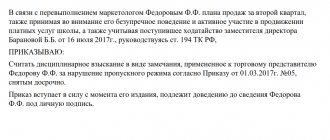The procedure for applying a disciplinary sanction in the form of disciplinary arrest to military personnel for committing a gross disciplinary offense is regulated by federal laws of December 1, 2006 No. 199-FZ “On legal proceedings based on materials about gross disciplinary offenses when applying disciplinary arrest to military personnel and on the execution of disciplinary arrest,” dated March 28, 1998 No. 53-FZ “On military duty and military service”, dated May 27, 1998 No. 76-FZ “On the status of military personnel” and the Disciplinary Charter of the Armed Forces of the Russian Federation (Decree of the President of the Russian Federation dated November 10, 2007 No. 1495) . The legislation of the Russian Federation provides exclusively for the judicial procedure for applying this type of disciplinary sanction to military personnel. The initiation of a corresponding petition before the court must be preceded by a trial on the fact of a gross disciplinary offense, which is carried out by decision of the unit commander (chief of the military police body), who appoints the person responsible for its conduct. The investigation, as a rule, is carried out by the immediate commander (superior) of the serviceman who committed a disciplinary offense in order to identify those responsible, identify the reasons and conditions that contributed to its commission. Based on the results, a protocol of the established form is drawn up. The serviceman in respect of whom the protocol has been drawn up must be familiar with it and have the right to submit comments on its content, which are attached to the protocol. The protocol is signed by the person who compiled it and the serviceman in respect of whom it was drawn up, after which, together with the materials of the proceedings and the proposal for the period of disciplinary arrest (other type of punishment), it is presented to the commander of the military unit (chief of the military police body). A copy of the protocol against signature is given to the serviceman in respect of whom it was drawn up.
During the proceedings, the following must be established: the event of the disciplinary offense (time, place, method and other circumstances of its commission);
the person who committed the disciplinary offense; the serviceman’s guilt in committing the disciplinary offense, the form of guilt and motives;
data characterizing the personality of the serviceman who committed a disciplinary offense;
the presence and nature of harmful consequences;
circumstances excluding, mitigating and aggravating disciplinary liability;
the nature and degree of participation of each serviceman in the commission of a disciplinary offense by several persons;
reasons and conditions that contributed to the commission of a disciplinary offense;
other circumstances relevant for the correct resolution of the issue of bringing to disciplinary liability.
The severity of the penalty increases if the disciplinary offense was committed while on combat duty (combat service) or while performing other official or special duties, while intoxicated, or if its consequence was a significant violation of internal order.
The right to apply for disciplinary arrest against a serviceman is granted to commanders (chiefs) from the squad commander and above or to the person who conducted the proceedings.
The authority to send materials about gross disciplinary offenses to the garrison military court for making a decision on the application of disciplinary arrest belongs to the commander of the military unit and the head of the military police body.
A lawyer, whose powers are certified by a warrant of legal education, is allowed to participate as a defense attorney in proceedings on materials regarding a gross disciplinary offense.
Materials about a gross disciplinary offense are considered by the judge of the garrison military court alone within three days from the date of their receipt by the garrison military court. If the serviceman in respect of whom the documents were sent is under arrest or detained, they are considered directly on the day of receipt.
Based on the results of the judicial review, the judge of the garrison military court may make one of the following decisions:
1) on the appointment of disciplinary arrest;
2) on the refusal to impose disciplinary arrest and on the return of materials to the commander of the military unit (the head of the military police body), who sent them to the garrison military court, for the application of another disciplinary measure in cases where disciplinary arrest cannot be applied to the military man;
another disciplinary measure may be applied based on the circumstances of the disciplinary offense, its consequences, the form of guilt and the personality of the serviceman;
3) on the termination of proceedings based on materials about a gross disciplinary offense in the following cases: if there is one of the circumstances that excludes disciplinary liability of a military serviceman; transfer of materials to the head of the military investigative body, if the action (inaction) of the serviceman contains sufficient data indicating signs of a crime, and a decision to release the serviceman from criminal liability in the manner prescribed by law has not been made.
The judge’s decision to apply disciplinary arrest to a military serviceman is announced immediately after the decision is made and for immediate implementation on the same day it is sent to the official authorized to execute it.
Senior military prosecutor of the 1st department of organizational management of the Main Military Prosecutor's Office, Colonel of Justice O.V. Kolbasenkov
The procedure for applying incentives and penalties to military personnel
The normal functioning of military units is impossible without unquestioning adherence to the regulations, coherence, diligence and precision in the implementation of assigned tasks.
Military discipline consists of the education of employees; understanding the laws of the Russian Federation and their compliance; maintaining a routine; thorough preparation; control and respect between subordinates and commanders.
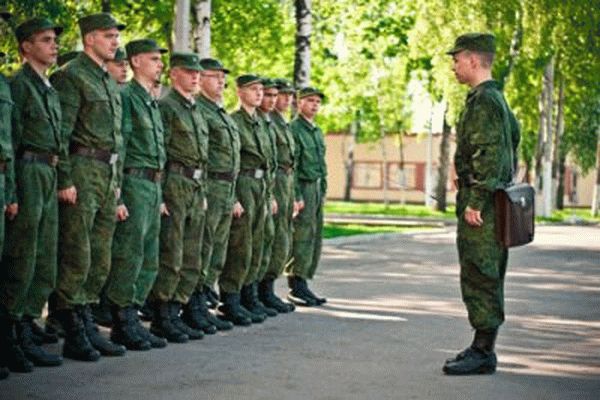
Military incentives and disciplinary sanctions became important methods for increasing discipline and education.
Management has the right to reward and punish both one military man and the entire military personnel. Persons who have received measures for any violations are encouraged to have the previously imposed penalties lifted.
Throughout their service, military personnel are rewarded for certain merits with bonuses and compensation. This has a positive impact on the attitude towards fulfilling one’s duty and patriotic education.
Responsibilities of a military personnel to maintain discipline
Maintaining discipline in the army is the strict implementation of the procedures and rules determined by commanders and the law.
Every soldier is obliged to respect state laws, social norms and military duty. While defending his homeland, he must be ready for self-sacrifice.
Military discipline is one of the most important components ensuring the efficiency and combat effectiveness of the army.
All departments keep records of violations and rewards given to service personnel. Supervisors should engage in periodic review of the correctness of their appointment. The corresponding entries must be made on the rewards and penalties card.
When a penalty is lifted, a note is made in the document: where, by whom and when it was canceled. If the removal did not take place during the year, but no new offenses were committed during the past period, it is necessary to put a note in the appropriate column about the cancellation of the punishment upon expiration of the term.
Once every six months, each employee must familiarize himself with the service card and sign on it. When a person is transferred, he is transferred to a new duty station.
Conviction became the main measure of instilling discipline in the army. But compulsory penalties may be taken against persons who are negligent in the performance of their official duties.
Military personnel who have committed disciplinary offenses are subject to all legal sanctions until the perpetrator is brought to criminal responsibility.
Types of disciplinary sanctions
Both conscripts and contract soldiers face disciplinary punishment if violations were committed in the service. All responsibility for them is reflected in the law “On the Status of Military Personnel.”
All offenses are divided into three categories:
- Minor. Made for the first time or after the cancellation of a previously imposed penalty. They entail the issuance of a warning, reprimand, reprimand, and sometimes a severe reprimand.
- Significant. Committed for the second time in six months, and there is an outstanding punishment.
- Rough. Serious violations of the rules, for which dismissal from service is provided.
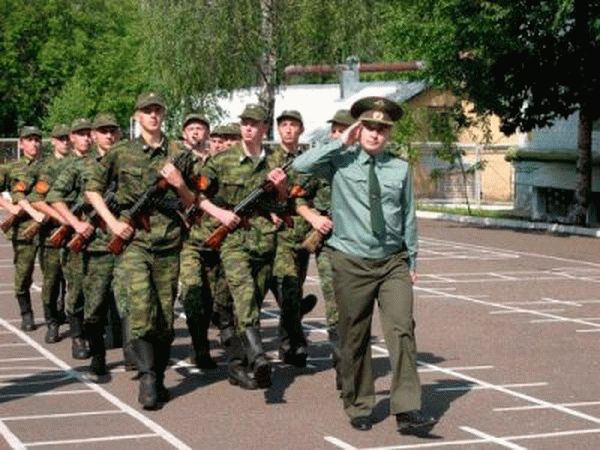
The following strictly defined measures are considered a disciplinary violation imposed on conscripts and contract soldiers:
- reprimand and severe reprimand;
- deprivation of another dismissal;
- demotion;
- removal of the badge;
- issuing an order on official non-compliance;
- reduction in rank;
- premature dismissal due to non-compliance with the contract;
- expulsion from an organization or from military training;
- arrest.
Arrest is used in extreme situations, for a serious offense. Appointed for a period of less than thirty days. The prisoner is kept in a guardhouse, isolated from the team. During an arrest, a person is not dismissed from service.
Disciplinary penalties applied to senior and junior officers:
- reprimand and severe reprimand;
- early dismissal;
- an order for professional inconsistency;
- demotion.
The following list of sanctions applies to senior officers:
- all types of reprimands;
- an order for professional inconsistency;
- demotion.
If a remark about a violation was made orally, then it will not be entered into the personal file and will not become a reason for punishment.
Disciplinary arrest of military personnel
Military service has its own specifics, including a closed information field. Types of liability such as administrative or civil law apply to the military when internal conflicts cannot be resolved without the dissemination of classified information. If a serviceman or a person called up for training commits an offense, whether by action or inaction, the issue of applying disciplinary measures to him is considered. They may be:
- reprimand, severe reprimand;
- deprivation - another dismissal or badge;
- warning about incomplete suitability for the position held;
- reduction - in rank and (or) position;
- early dismissal from contract service;
- deductions - from a military educational institution, from military training;
- disciplinary arrest.
Arrest is used only in cases of gross disciplinary offense. This is the most severe measure of influence against the guilty person, applied in exceptional cases. If the court considers it necessary to punish a serviceman in this way, he is isolated from others and placed in a guardhouse.
In some cases, an unlawful action (inaction) of a serviceman or a person called up for military training coincides in characteristics with an administrative offense. In such situations, the appointment of a disciplinary arrest is possible only if a similar arrest is provided for in administrative law.
You are advised by the best qualified lawyers
Free: Our lawyers provide free initial consultation on any legal issues. 90% of cases are resolved with one free consultation.
24/7: real estate via online chat, or call the hotline 24 hours a day, 7 days a week
There are categories of persons against whom disciplinary arrest cannot be applied. This category includes:
- officers and persons who are called up as them for military training;
- persons who have not yet taken upon themselves military obligations in accordance with the taken military oath;
- persons who already have military status, but have not yet reached the age of eighteen;
- female military personnel.
Note!
The appointment of disciplinary arrest is possible only by order of the judge of the garrison military court.
A person accused of a gross disciplinary offense has the right to:
- appeal the decisions of the commander who initiates bringing him into administrative arrest;
- give explanations on the case being examined against him and present evidence in his defense;
- get acquainted with the materials of the case regarding the commission of an offense after the end of the proceedings;
- participate in the trial of the case;
- use the services of a lawyer who has a confirmed status.
Note!
The accused has the right to engage a lawyer to protect his rights from the moment the judge approves the decision to schedule a review of the materials in the case.
In situations where a suspect is detained for a disciplinary offense, it is possible (and desirable) to use the services of a lawyer from the moment of detention.
Imposition of penalties in special cases
Garrison commanders, together with commandants and senior naval leadership, have the right to punish subordinates of their own or another garrison:
- if the employee violated the rules specified in the charter;
- for an offense outside the garrison;
- for actions outside the unit.
Commanders who have imposed punishment on persons from another unit report this to their commanders and must make a note on the trip ticket, vacation ticket or order.
After returning, military personnel also need to bring information about the penalty received to the attention of their direct superiors. Concealing this fact will result in punishment.
When military personnel are not subordinate to one another, the senior in position or rank must command.
If a junior employee behaves in violation of the regulations in front of a senior employee, the latter must make a reprimand to the former, and, if it does not have an effect, resort to other measures, including escorting the offender to the commandant’s office.
Who has the right to apply penalties and incentives?
The commander (that is, the boss) has the right to give orders, and the subordinate is obliged to obey unconditionally and help him in maintaining order and rules of behavior.
Only the direct superior, as well as the managers named in the previous chapter, can apply rewards and disciplinary punishments (except for arrest). Arrest for gross abuses is ordered by the garrison judge.
Commanders exercise authority over their subordinates in accordance with their military rank assigned to the position they occupy. If they occupy it temporarily, then this is carried out according to the position stated in the order.
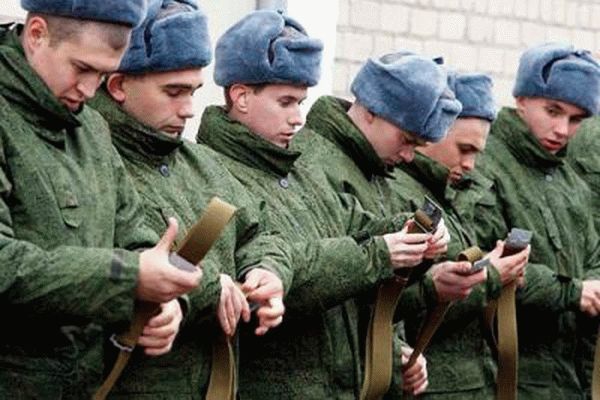
Officers on business trips with units as superiors can exercise power one step above the rights of their position. The same is true for officers from educational institutions.
The Minister of Defense exercises full disciplinary power in relation to all military personnel. His deputies have rights one step lower.
Civilian personnel holding military positions have the right to reward and punish military personnel in accordance with the position.
Higher commanders cannot cancel or reduce the punishment applied by lower commanders if they have not exceeded their authority.
Enforcement of disciplinary sanctions
The punishment must be carried out immediately, sometimes no later than the expiration of the statute of limitations for possible prosecution. At the end of the time, the penalty will not be executed, but it remains on the card.
A disciplinary sanction is applied to a serviceman in the manner specified in the Disciplinary Charter:
- A reprimand and severe reprimand must be announced with a reason.
- Deprivation of dismissal implies a prohibition on leaving the unit without necessity for work during the week.
- The removal of the badge occurs by order of the head of the unit during formation.
- The issuance of an order on official inconsistency can be made once during the tenure of the position. If the culprit has not corrected himself within 30 days, he may be demoted or fired.
- Demotion occurs by order of the commander and does not depend on the wishes of the subordinate.
- When a rank is demoted, time is given to replace insignia. It is forbidden to tear them down and humiliate the dignity of the employee.
- Premature dismissal due to failure to fulfill the contract. If over the past period of time a military man has not served his conscription term, he is sent to complete his service. Two months of the contract are counted as a month of conscription.
- Expulsion from an organization or from military training is applied when one or more serious offenses are committed.
- The judge's decision to arrest must be executed immediately after it is made. It can only be canceled by a higher authority. Used in rare cases.
The announcement of disciplinary sanctions to offending commanders must be made in the absence of subordinates.
Challenging collection
A serviceman who has been held accountable has the right to present evidence, give explanations, and appeal the commander’s decision.
Within 10 days it will be possible to submit a report against the commander to a superior officer. In addition, submit an application to the military court no later than three months after the sentence is imposed. There is no time limit for contacting the prosecutor's office.
If the punishment is cancelled, the serviceman is considered to have no disciplinary sanctions.
Appealing a disciplinary order
The right to appeal a decision to impose a disciplinary sanction is granted in the following cases:
- insufficient evidence;
- false accusation;
- discrepancy between the severity of the offense and the announced punishment, when too harsh measures are applied for a minor offense.
The complaint is submitted to the superior commander. In more serious cases - to a military court. Theoretically, every soldier has the right to challenge the decision on punishment. In practice, this works extremely rarely and only among officers.
Types of incentives
Management should reward its subordinates for their demonstrated personal merit, diligence and initiative. Military personnel can receive state awards, presidential diplomas and commendations, and insignia.
Incentives applied to officers:
- cancellation of a previously received penalty;
- presentation of various certificates and thanks;
- awarding bonuses or presenting valuable gifts;
- early assignment to the next rank;
- delivery of registered weapons;
- entry into the Book of Honor.
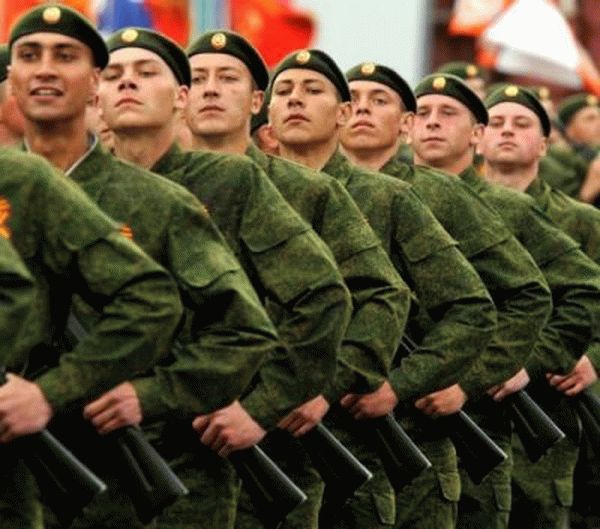
The above incentives are applied to soldiers, sailors and sergeants serving on conscription, but are not awarded weapons. And besides:
- give the rank of senior sailor and corporal;
- notify relatives or former colleagues about the employee’s successes;
- awarded with a photograph against the background of a banner;
- awarded insignia.
All types of incentives, except gratitude, are applied to contract employees in the positions of soldiers, sergeants, foremen and sailors.
Encouraging military personnel also includes bonuses. It is carried out for certain merits and is most often paid to contract soldiers. Types of material incentives:
- for conscientious performance of duty, military personnel are paid a bonus in the amount of three salaries at the end of the year;
- “thirteenth salary” - annual;
- quarterly - for military merits;
- monthly (in some cases).
Bonuses can be applied and calculated depending on salary and position, number of days served.
Procedure for applying incentives
Rights of commanders to implement incentives:
- A serviceman who has a penalty is encouraged to have it removed. The commander who imposed the penalty or his superior officer has the right to do this.
- They are announced at a formation, military meeting, in person or by order.
- Along with the order, certificates, awards, valuable gifts, etc. are transferred.
Company and battalion commanders have the right to remove penalties, express gratitude, and report to the serviceman’s place of residence about his successes in service.
The regiment commander, together with the above, is allowed to:
- presentation of certificates, gifts, photographs, awards, badges;
- assignment of corporal rank;
- early promotion to the rank of sergeants and foremen;
- entry into the Book of Military Honor.
All high command can implement a full range of incentives.
When establishing the type of reward, the serviceman’s merits, diligence and his attitude towards service are taken into account.
If you have had experience of contacting the military prosecutor's office due to an illegal disciplinary punishment, write and share the results with us.
Range of possible punishments in the army
The following disciplinary sanctions may be imposed on privates and non-commissioned officers undergoing conscription military service:
- reprimand (simple, strict, with entry on the card, without entry);
- out-of-turn outfit (a maximum of five outfits can be assigned);
- deprivation of leave for a week, including attendance at festive events organized on the territory of a military unit;
- removal from position (transfer to a lower position);
- reduction of military rank (for sergeants and foremen);
- ban on wearing a badge;
- disciplinary arrest by decision of the garrison court with serving the sentence in a guardhouse.
Demotion in rank may involve transfer to a lower position. The following applies to warrant officers and officers, as well as personnel performing military service on a contract basis:
- reprimand (simple, strict, with or without entry in your personal file);
- removal from position (transfer to a lower position);
- demotion in rank (for sergeants and foremen), officers are not subject to this punishment;
- requisition of a badge;
- warning about official inadequacy of the position held;
- deprivation of part of the monetary allowance (thirteenth salary, monthly or quarterly bonus);
- dismissal for discredit;
- disciplinary arrest by decision of the garrison court with serving the sentence in a guardhouse.
In cases where the offense is related to an administrative violation or a criminal act, the unit commander is obliged to inform the military prosecutor's office. This applies to both conscripts and contract soldiers.
Reference! The list of disciplinary punishments and grounds for an official investigation does not include a commander’s remark made orally. Verbal reprimand is not entered into the military personnel file or card.
Legislative framework of the Russian Federation
Free consultation
Navigation
Federal legislation
Actions
- home
- “DISCIPLINARY CHARTER OF THE ARMED FORCES OF THE RUSSIAN FEDERATION” (approved by Decree of the President of the Russian Federation dated December 14, 1993 N 2140) (as amended on June 30, 2002)
| Name of document | “DISCIPLINARY CHARTER OF THE ARMED FORCES OF THE RUSSIAN FEDERATION” (approved by Decree of the President of the Russian Federation dated December 14, 1993 N 2140) (as amended on June 30, 2002) |
| Document type | list, order, decree, charter |
| Receiving authority | President of the Russian Federation |
| Document Number | 2140 |
| Acceptance date | 01.01.1970 |
| Revision date | 30.06.2002 |
| Date of registration with the Ministry of Justice | 01.01.1970 |
| Status | cancelled/lost force |
| Publication |
|
| Navigator | Notes |
The procedure for imposing disciplinary sanctions
85. A serviceman who has violated military discipline or public order may be subject to only those disciplinary sanctions that are defined in this Charter and correspond to the military rank of the serviceman and the disciplinary authority of the commander (chief) who decides to bring the perpetrator to disciplinary liability.
86. The decision by the commander (chief) to impose a disciplinary sanction on a subordinate must be preceded by a trial. It is carried out in order to identify the perpetrators, identify the causes and conditions that contributed to the commission of the offense.
During the proceedings, the commander (chief) establishes: whether an offense actually occurred; where, when, under what circumstances and for what purpose was it committed; what he expressed himself in; the presence of guilt in the action (inaction) of specific persons and the degree of guilt of each in the event of an offense committed by several persons; what are the consequences of the offense; circumstances mitigating and aggravating the responsibility of the guilty person; reasons and conditions that contributed to the commission of the offense.
If during the proceedings it turns out that the serviceman’s misconduct contains elements of a crime, the commander of the military unit notifies the military prosecutor,, if necessary, initiates a criminal case and orders an inquiry.
87. When determining guilt and disciplinary measures, the following are taken into account: the nature of the offense, the circumstances in which it was committed, its consequences, the previous behavior of the perpetrator, as well as the duration of his military service and the degree of knowledge of the procedure for performing service.
The severity of the disciplinary sanction increases if the offense was committed while on combat duty (combat service) and in the performance of other official duties, while intoxicated, or if it resulted in a significant violation of order.
88. The imposition of a disciplinary sanction on a serviceman who has committed an offense is carried out, as a rule, within 24 hours, but no later than 10 days from the day when the commander (superior) became aware of the offense committed. When imposing a disciplinary sanction, the commander (chief) must not humiliate the personal dignity of the subordinate and allow rudeness.
A warning, remark or strict indication of omissions in service expressed by a commander (chief) to a subordinate is not a disciplinary sanction.
A serviceman who considers himself innocent has the right to file a complaint within 10 days from the date of imposition of a disciplinary sanction.
89. The imposition of a disciplinary sanction on a serviceman who is part of a daily detachment (on combat duty), for offenses committed by him during service, is carried out after a change from the detachment (combat duty) or after replacing him with another military personnel, but not earlier than after day.
90. The imposition of a disciplinary sanction on a serviceman who is in a state of intoxication, as well as obtaining any explanations from him, is postponed until he sobers up. In these cases, if necessary, he can be placed in a guardhouse or in a temporary detention cell for up to one day, after which a decision is made on his responsibility.
91. It is prohibited to impose several disciplinary penalties for the same offense or to combine one penalty with another, or to impose penalties on the entire personnel of a unit instead of punishing the direct culprits.
(as amended by Decree of the President of the Russian Federation dated June 30, 2002 N 671)
92. If the commander (chief), due to the gravity of the offense committed by a subordinate, considers the disciplinary power granted to him insufficient, he initiates a petition to impose a penalty on the perpetrator by the authority of the senior commander (chief).
A commander (chief) who has exceeded the disciplinary authority granted to him bears responsibility for this.
93. A senior commander (chief) does not have the right to cancel or reduce a disciplinary sanction imposed by a junior commander (chief) due to the severity of the penalty, if the latter has not exceeded the authority granted to him.
The senior commander (chief) has the right to cancel a disciplinary sanction imposed by a junior commander (chief) if he finds that this sanction does not correspond to the gravity of the offense committed, and to impose a more severe penalty.
94. A military serviceman subjected to disciplinary action for a crime committed and material damage caused to the state is not exempt from criminal and material liability.
Release of military personnel from disciplinary arrest
At the end of the article, it is important to consider the circumstances under which the applied punishment can be canceled.
According to Art. 36 No. 199-FZ, early termination of disciplinary arrest is possible only by decision of a military court. The latter must be requested by the leadership of the military unit in which the guilty soldier is serving. It is worth noting that the court is obliged to consider such a petition no later than 24 hours from the date of registration.
The grounds for canceling the arrest are:
- a change in legislation that excludes disciplinary liability for committing an action that involves arrest;
- death of a serviceman or recognition as missing;
- exclusion of a military man from the lists of military personnel due to dismissal.
In other cases, early termination of the punishment in question is allowed.
For example:
- Based on the results of the medical examination, it was recognized that the military man cannot be under arrest for health reasons;
- If the culprit needs urgent leave for personal reasons (for example, the death of a close relative);
- When issuing a normative act, according to which military unit personnel are sent to eliminate the consequences of natural disasters, as well as to perform urgent combat missions in other emergency circumstances.
The procedure for applying disciplinary sanctions to military personnel
36 UVS RF Armed Forces (for more details, see
Ch. IV of this edition). Only one disciplinary sanction can be removed from a serviceman at a time.
83. The application of punishment to a military personnel who has committed a disciplinary offense is carried out within 10 days from the day when the commander (superior) became aware of the offense committed (not counting the time for conducting proceedings, proceedings in a criminal case or in a case of an administrative offense, time illness of a serviceman, his presence on a business trip or leave, as well as the time he performed a combat mission), but before the expiration of the statute of limitations for bringing the serviceman to disciplinary liability.
The GVP answers: Removing a disciplinary sanction from a serviceman
Question:
He served as a unit service chief. In November 2015 he was supposed to be transferred to a new duty station. Due to the lack of a replacement, the impossibility of transferring affairs and positions, the unit commander did not let go. He refused to perform his duties, as a result of which in January 2021 he was declared incomplete for service and given a severe reprimand. After the transfer to a new duty station, the new commander could not remove these penalties by his decision. Documents were sent twice to remove them, but to no avail. They have not yet been removed. Since I went on a business trip for 3 months, communication with the command is difficult. What can be done to remove these penalties?
Alexey, Samara
Answer from the head of the personnel department of the Main Military Prosecutor's Office, Major General of Justice Igor Tripolev:
In accordance with Articles 10, 35, 36, 46, 96, 103 of the Disciplinary Charter of the Armed Forces of the Russian Federation (hereinafter referred to as the Charter), only direct superiors can apply incentives and disciplinary sanctions to military personnel. The disciplinary power granted to subordinate commanders (chiefs) always belongs to higher commanders (chiefs).
The right to lift a disciplinary sanction belongs to the commander (chief) by whom the sanction was applied, as well as to his direct superiors, who have no less disciplinary power than him. Only one disciplinary sanction can be removed from a serviceman at a time.
The commander (chief) has the right to lift a disciplinary sanction only after it has played its educational role and the serviceman has corrected his behavior by exemplary performance of military duty.
A disciplinary sanction - a warning about incomplete service compliance - is applied once during the stay of a serviceman performing military service under a contract in his regular military position. The removal of this penalty is carried out no earlier than one year from the date of its application.
After a year has passed after the application of this disciplinary sanction, the commander (chief), within up to 30 days, makes a decision (petition) to remove this disciplinary sanction or, if the serviceman has not corrected his behavior by exemplary performance of military duty and the sanction has not played its educational role, to reduce this serviceman in a military position or his early dismissal from military service in accordance with the established procedure.
A serviceman is considered to have no disciplinary sanctions after they are lifted by the relevant commander (superior) or after one year has passed from the date of the last penalty, unless another disciplinary sanction was applied to him during this period.
If a disciplinary sanction applied to a serviceman (except for those provided for in Article 36 of the Charter) is not lifted after the expiration of a year and during this period he does not commit another disciplinary offense, a note is made in the serviceman’s service record that the sanction has been lifted upon expiration of the period.
In case of violation of your rights by military officials, you can contact the military prosecutor's office of the Samara garrison at the address: Samara, st. Eroshevskogo, 94.
The procedure for imposing disciplinary sanctions
The disciplinary charter defines the essence of military discipline, the responsibilities of military personnel to comply with it, the types of rewards and penalties, the rights of commanders (superiors) to apply them, as well as the procedure for submitting and considering appeals (proposals, applications and complaints). Firstly, it was developed on the basis of Federal Law No. 203-FZ
“On amendments to certain legislative acts of the Russian Federation on issues of liability of military personnel”
, adopted in December 2006.
During the proceedings, the following must be established: - the event of the disciplinary offense (time, place, method and other circumstances of its commission); - the person who committed the offense; — the serviceman’s guilt in committing an offense, the form of guilt and the motives for committing a disciplinary offense; — data characterizing the personality of the serviceman who committed a disciplinary offense; — the presence and nature of the harmful consequences of a disciplinary offense; — circumstances excluding the serviceman’s liability; — circumstances mitigating disciplinary liability and circumstances aggravating liability; - the nature and degree of participation of each of the military personnel when a disciplinary offense is committed by several persons; — reasons and conditions that contributed to the commission of a disciplinary offense; - other circumstances that are important for the correct resolution of the issue of bringing a serviceman to disciplinary liability.
On some problems of applying disciplinary sanctions against military personnel (Shishkanov V.
What is disciplinary arrest
Service in the army is characterized by a number of high requirements for discipline and physical training of persons entering the service. One of them is compliance with current legislation, departmental Charter, instructions and orders. If there is a deviation from these norms, the command is obliged to respond to it and apply disciplinary sanctions.
First of all, it is worth studying the regulatory framework. Disciplinary arrest of military personnel is provided for in Art. 28.4. Federal Law of the Russian Federation “On the status of military personnel of the Russian Federation” and is considered as one of the types of punishments for committing misconduct in the service.
The penalty is applied to male military personnel of all categories, as well as citizens called up for training and taken the Military Oath. In other cases, arrest is not permitted.
The essence of this type of punishment is the complete isolation of the offender in a special premises of a military unit or a ship's guardhouse for a certain period. Duration of arrest according to Art. 28.4. Federal Law “On the status of military personnel of the Russian Federation cannot exceed 1 month.
At the same time, you need to understand that while serving a sentence, a person may commit a repeated violation, for which a guardhouse is provided. In this case, part 4. Art. 28.4 of the mentioned Law allows for the summation of terms and an increase in the duration of arrest to 45 days.
Legislative framework of the Russian Federation
87. When determining guilt and disciplinary measures, the following are taken into account: the nature of the offense, the circumstances in which it was committed, its consequences, the previous behavior of the perpetrator, as well as the duration of his military service and the degree of knowledge of the procedure for performing service.
The severity of the penalty increases if the offense was committed while on combat duty (combat service) and in the performance of other official duties, while intoxicated, or if it resulted in a significant violation of order.
Grounds for disciplinary action
Military discipline may be violated by one of the following types of offenses:
- intentional;
- careless;
- rude;
- small.
Intention is understood as when a person who has committed or is committing an offense is aware of his actions, and therefore understands the consequences and what his actions or inactions can lead to. If the serviceman did not suspect the impending consequences of his actions, then his offense can be considered not intentional.
Minor offenses can be understood as actions (or inaction) as a result of which no harm was caused to the order or to unauthorized persons. For example, you can indicate: being late for service, not a gross violation of the regime of a military unit.
More serious offenses include the following:
- hazing in the unit;
- leaving the territory of a military unit without the permission of the commander, with the exception of officers;
- failure to appear from dismissal or hospital on time;
- absence from the place of duty for more than 4 hours without good reason;
- failure to appear at the military registration and enlistment office;
- violation of the order of combat duty, border, guard service, patrol, and protection of public order;
- improper handling of ammunition, weapons, equipment, if damage is caused to military personnel or property of a military unit;
- violations of traffic rules and rules for driving a car and heavy equipment, if negligence caused harm to military personnel or property;
- being on duty under the influence of alcohol or drugs.
Disciplinary responsibility of military personnel
misconduct in accordance with Art.
48 of the DU of the RF Armed Forces are any violations of military discipline or public order. It must be recognized that the norms of this act contain a certain differentiation of offenses, singling out gross disciplinary offenses from their total mass, however, this division is advisory in nature and can only be taken into account when choosing the type and amount of punishment in each specific case.
The article was written based on materials from the sites: nagrazhdanke.ru, zakonbase.ru, yuridicheskayakonsulitatsiya.ru.
«




